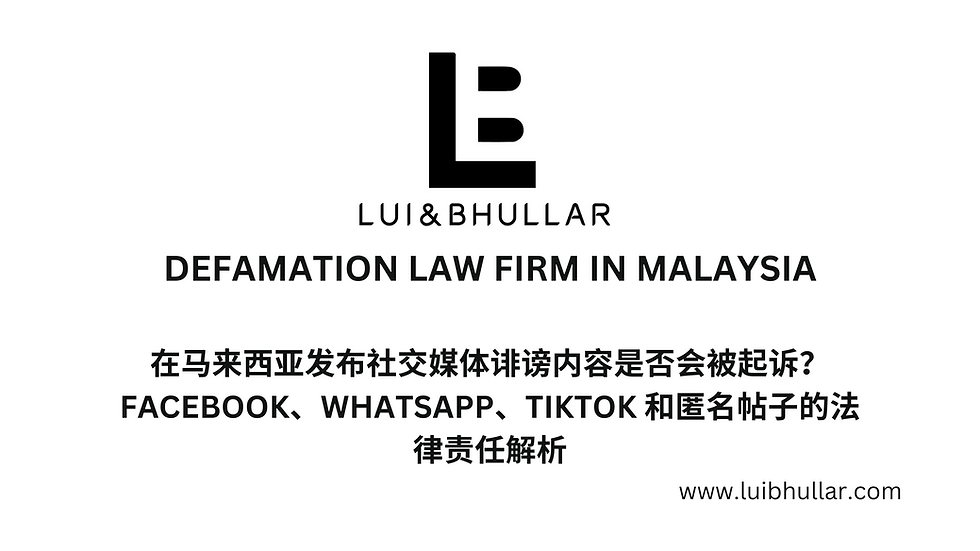Top 10 Defamation FAQs in Malaysia: What You Need to Know About Online & Social Media Defamation, Libel, and Slander
- Messrs Lui & Bhullar
- Jul 21, 2025
- 3 min read
Updated: Oct 15, 2025
By Messrs Lui & Bhullar

Top 10 Defamation FAQs in Malaysia: What You Need to Know About Online & Social Media Defamation, Libel, and Slander
1. What Is Defamation in Malaysia? (Libel vs Slander)
Defamation in Malaysia is governed primarily by the Defamation Act 1957 and judicial precedent. It refers to any false statement that injures a person's reputation.
Libel refers to written or published defamation (e.g. newspaper, blog, or Facebook post).
Slander is spoken defamation (e.g. a false statement made at a business event or in a video).
Both forms are actionable under defamation law in Malaysia if they damage reputation and are untrue.
2. How to Prove Defamation in Court?
A plaintiff must prove three key elements:
Defamatory statement: The words must lower the person’s standing in society.
Reference to the plaintiff: The statement must clearly refer to the person or business affected.
Publication: The defamatory statement must be communicated to at least one third party.
Whether it’s libel or slander in Malaysia, evidence is crucial in a defamation case.
3. Can I Sue an Anonymous Online Defamer?
Yes, suing anonymous users involved in online defamation in Malaysia is possible. Your defamation lawyer can file a Norwich Pharmacal Order to compel social media platforms or ISPs to reveal the identity of anonymous defamers on Facebook, Telegram, WhatsApp, or other channels. The law supports victims of social media defamation in seeking accountability.
4. What Are the Defences to Defamation in Malaysia?
Common defences under defamation law in Malaysia include:
Justification: The statement is true.
Fair comment: The statement is an honest opinion based on facts.
Qualified privilege: Statements made in the discharge of legal, moral, or social duty.
Absolute privilege: Statements made in court or in Parliament.
A skilled defamation lawyer in KL can assess whether any of these apply to your case.
5. What Types of Damages Can Be Awarded?
Malaysian courts may award:
General damages: For loss of reputation and emotional distress.
Aggravated damages: If the conduct was malicious or aggressive.
Exemplary damages: To punish especially egregious conduct.
The quantum of defamation damages in Malaysia depends on the seriousness, reach, intent, and harm caused.
6. What Is the Limitation Period for Defamation Claims?
You must file a defamation claim within 6 years from the date the defamatory statement was published or broadcast. Prompt legal action is advised, especially in online defamation Malaysia cases where content may be deleted or altered.
7. How Does Social Media Defamation Differ?
Social media defamation in Malaysia can spread more rapidly and cause greater reputational damage. Posts on Facebook, Instagram, WhatsApp, or Telegram can go viral instantly. Courts have acknowledged that defamation on these platforms carries unique challenges, especially in proving reach and malice. Digital evidence must be preserved immediately.
8. Are Insults Considered Defamation?
Not all insults amount to defamation. Malaysian courts differentiate between:
Harsh opinion (protected as free speech)
False factual accusation (actionable as defamation)
A statement becomes libel or slander in Malaysia when it falsely portrays a person as dishonest, immoral, or criminal. Mere name-calling or emotional language may not suffice.
9. Can Repeating a Rumour Make Me Liable?
Yes. Even if you didn’t originate the defamatory content, republication of false statements—by sharing, forwarding, or reposting—can make you legally liable. This applies heavily in online defamation Malaysia and social media defamation contexts.
10. Can Businesses Sue for Defamation in Malaysia?
Yes. Under defamation law in Malaysia, companies and organisations can file defamation suits if false statements damage their business reputation or result in financial loss. This applies to libel (e.g. a damaging news article or review) or slander (e.g. verbal accusations at a public forum).
In recent High Court decisions, corporate plaintiffs have successfully claimed defamation damages in Malaysia, especially in online defamation cases involving viral content or malicious reviews on platforms like Facebook, Google Reviews, or WhatsApp.
A knowledgeable defamation lawyer in KL can help businesses assess whether the defamatory statement meets the required legal threshold and file for general or aggravated damages.
At Lui & Bhullar, we offer strategic advice and strong representation in cases involving corporate defamation, libel and slander, and social media defamation.
Conclusion
If your personal or business reputation has been unfairly harmed, don’t delay. The rise of online defamation in Malaysia makes it crucial to act fast. Consult a top defamation lawyer to explore your rights and seek remedies under defamation law in Malaysia.
Need Legal Advice on Defamation?
If you're unsure how to sue for defamation in Malaysia or need to identify the person behind defamatory online content, consult our legal team today. At Messrs Lui & Bhullar, we combine strong legal strategy with digital expertise to hold online defamers accountable.
📧 Email: general@luibhullar.com
📞 WhatsApp: +60143000970




Comments